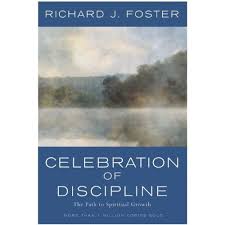What is a spiritual discipline?
 Starting next week, I’ll begin a Bible Study on this page that looks at various practices and habits a Christian can use to help them grow in their intimacy with God. I’ll be using Richard Foster’s classic book, Celebration of Discipline, for the structure of the study prompts. As always, the Bible will act as my foundation.
Starting next week, I’ll begin a Bible Study on this page that looks at various practices and habits a Christian can use to help them grow in their intimacy with God. I’ll be using Richard Foster’s classic book, Celebration of Discipline, for the structure of the study prompts. As always, the Bible will act as my foundation.
For centuries, those desiring a closer, inward-focused relationship with God, used the term “disciplines” to denote those activities we routinely do to keep our focus on Christ and His ways. Richard Foster popularized the term “Spiritual Disciplines” in his classic book published in 1978.
I guardedly recommend Foster’s book. For some of us, Foster’s ideas might sound off-beat and we may wonder if they are biblically based. After all, the term “spiritual discipline” is not in the Bible. However, the concept of spiritual training and each of the chapter topics are part of biblical doctrine. How Richard Foster chooses to handle those topics – aye, there’s the rub.
Does Foster go too far?
It’s unfortunate that Foster launches into meditation, prayer, and fasting as his first three topics. Meditation, in particular, is a discipline for the more mature Christian, partly because the world has blemished its meaning and intent so that, in most people’s minds, meditation is a polar opposite of what Scripture intends it to be. I think I would have started with a topic more appropriate for the new Christian. As a writer, though, I can understand. Meditation is an effective attention grabber as the first topic out of the shoot.

Foster talks much about God speaking directly to us in those times of meditation. Realize that Foster is a Quaker and his background influences what he writes. Quakers are most noted for believing that God can and does speak directly to us. We call this extra-biblical revelation. I, the leadership of my church, and the professors of my seminary do not hold to this viewpoint; we believe a Christian’s first understanding comes from the Word of God and that the Word of God is all we need to understand and apply what God would have us do.
So when Foster discusses listening for God’s instructions, I find myself wary. Opening ourselves to listening for God’s voice causes us to teeter precariously over the edge of a cliff. Foster admits we could so easily be swayed by our own desires or worse yet, influenced by the voice of the enemy. I would prefer to step back into the solid security of the Word of God, to read it first, and then ask, “What is this telling me to do?” and “How must I live my life according to what I am reading?”
Let’s not throw out the baby with the bathwater.
I’m not dismissing Foster’s book all together. There are some shining gems of wisdom in his text and his thoughts have compelled me and many others to make the time to spend moments alone with God. I love his classic line that we need to approach our understanding of current events with the Bible in one hand and the newspaper in the other.
We can use Celebration of Discipline as a launching pad to discover what the Bible says about the topics he proposes. It is important to ponder what practices and habits are necessary for a Christian to pursue in order to grow in godliness and intimacy with God. While I don’t believe in extra-biblical revelation – that God speaks directly to people outside of the Word of God — perhaps we need to be more open to the role of the Holy Spirit in guiding our understanding of God’s Word and the timing of His prompts to obey His Word. 2 Timothy 2:7 – “Reflect on what I am saying, for the Lord will give you insight into all this” – shows us that God is definitely engaged in helping us understand and apply Scripture, if we will but stop and allow ourselves to think about it.
Another aspect fuels Foster’s approach. Foster wrote in the 1970’s when there was a huge movement to get away from a legalistic, outward appearance form of religion. People longed for an inner personal relationship with God and some of their questions were, “What do I need to do to get that personal relationship? How can I grow in godliness and be more sensitive to spiritual things? How can I integrate this into my daily life instead of having only a Sunday-go-to-meeting kind of religion?” Those are valid questions which I hope to address over the next few weeks.
Let’s study spiritual disciplines together!
You don’t need to read Foster’s book to participate in the study I will present over the next few weeks. It’s a deep book. Should you choose to read it, do so with an open and discerning mind with your Bible beside you. (We should do that with ANY Christian book, magazine article, or blog post, including anything written by yours truly!) Regardless, I hope you will pursue the practice of spiritual disciplines and that in doing so, you grow closer to your Lord and Savior, Jesus Christ.
Each week, I’ll post a new topic along with a series of questions. You can use those questions throughout the week to study on your own. Feel free to print them out and use them with your small group.
Let the journey begin!
You can purchase Celebration of Discipline on Amazon or at christianbook.com

Leave a Reply